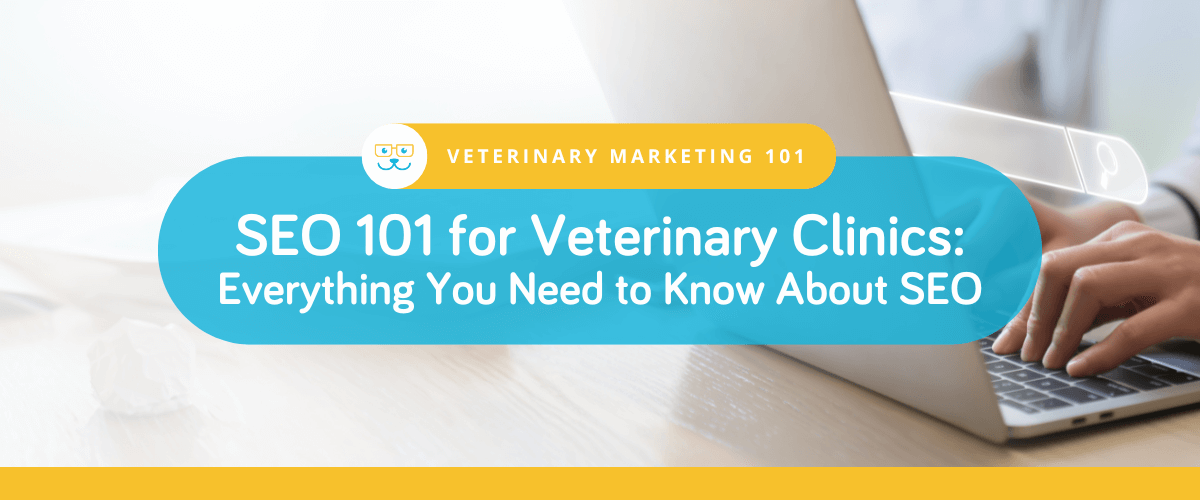SEO 101 for Veterinary Clinics: Everything You Need to Know About SEO
If you've ever wondered why your veterinary clinic isn't appearing on Google despite providing excellent care, you're not alone. Search Engine Optimization (SEO) can seem confusing, especially if you're not tech-savvy. However, the reality is that SEO is one of the most effective tools for growing your practice, and it's not as complicated as it may seem.
Let's break down what SEO is, why local SEO deserves its own strategy, and which practical steps you can take today to start ranking higher and attracting more clients.
What Really Is SEO?

SEO stands for Search Engine Optimization, and at its core, it's the process of making your website and online presence more appealing to Google (and other search engines) so that you show up higher in search results.
Higher visibility = more clicks = more clients. Simple as that.
However, not all SEO is created equal, especially for brick-and-mortar businesses like veterinary clinics. That's where local SEO comes in.
Why Local SEO Matters for Veterinary Clinics
Local SEO differs from general SEO because it's designed to help you appear in searches with local intent. Think "veterinarian near me" or "emergency animal hospital in Austin."
Local SEO uses an entirely different set of ranking factors, including:
- Google Business Profile (GBP) optimization
- Local keywords (like "dog vaccines in Glenside")
- Online reviews and reputation management
- NAP consistency (Name, Address, Phone) across all online directories
- Local backlinks (mentions or links from other community businesses like rescues and the chamber of commerce)
Most pet owners search online first when looking for a veterinarian. If your clinic isn't showing up when and where they search, you're losing clients to the clinic down the street.
Genius Tip: Check out our blog post "The Power of Local SEO: Why It’s a Game-Changer for Veterinary Practices" to understand how to use local SEO to your advantage!
Learn About the Power of Local SEO
SEO Basics Every Veterinary Clinic Needs
Here are the foundational SEO must-haves for every veterinary practice:
- A fully optimized Google Business Profile
- A mobile-friendly website with local keywords and clear service pages
- A process for consistently gathering and responding to online reviews
- Accurate, consistent NAP information
- Original, human-written content that answers common pet owner questions
Done right, SEO offers long-term ROI by reducing your dependence on paid ads and consistently attracting the right clients over time.
If You Can Only Tackle Three SEO Tasks…
Feeling overwhelmed? Start with these three high-impact tasks:
- Optimize Your Google Business Profile: Add accurate NAP info, business hours, and high-quality photos, and update it regularly.
- Ask for Google Reviews (and respond!): Set up a process to request reviews after appointments. Ensure keywords like "dog dental cleaning" or "cat vaccinations" are naturally mentioned when possible.
- Optimize Your Website: Use city-specific keywords, break out services into pet-specific pages, and ensure your site loads fast and works well on mobile.
These three steps alone can dramatically improve your local visibility.
Tools to Help You Manage SEO In-House
Even if you're not ready to hire an SEO expert, these free and low-cost tools can help:
- Google Business Profile Manager - Update hours, respond to reviews, and track engagement.
- Google Search Console - Monitor how your website ranks in search and fix basic technical issues.
- Reputation Management Tools - Platforms like Birdeye can automate review requests and monitor your online reputation.
The Structure of Your Website Matters More Than You Think
A poorly structured website can hurt your SEO in two significant ways:
- Google may not understand your content if it is hidden behind confusing URLs, messy menus, or buried pages.
- Visitors may leave quickly if they can't find what they need fast, which sends negative signals to Google about your site's quality.
Every service should have its page (like "Dog Spay & Neuter in Nashville"), and your navigation should be straightforward and easy to use.
Voice Search Is Changing the Game
More people are using voice assistants like Siri and Alexa to search for veterinary care. That means your content should answer natural, conversational questions, like:
- "What shots does my kitten need?"
- "Where's the nearest emergency veterinarian open now?"
Include FAQ sections on your website, write blog posts that directly answer questions, and use structured data (schema) to help Google understand your content.
Genius Tip: Check out our blog post "SEO Voice Optimization for Veterinarians: How to Get Found in Voice Search" to learn how to optimize your content for voice searches.
How Do I Get Found in Voice Search
Content That Performs

Thanks to Google's Helpful Content Update, original, experience-driven content is more important than ever. Google rewards content that demonstrates:
- Experience (Have you actually done this?)
- Expertise (Are you qualified to speak on it?)
- Authority (Are others linking to or referencing your content?)
- Trust (Is your content explicit, honest, and helpful?)
Generic or AI-generated content won't cut it. If writing isn't your strength, or if content keeps falling to the bottom of your to-do list, it may be time to bring in a professional.
Want to Know How Your SEO Is Really Performing?
Let’s take a look behind the exam room door. Book a free Marketing Health Exam, and we’ll analyze your clinic’s current online visibility, website performance, and content quality so you know exactly what’s working and what’s not.
Book Your Complimentary Marketing Health Exam
Want more tips like this every week?
Subscribe to the GeniusVets Weekly Newsletter and get fresh insights, free resources, and veterinary marketing strategies delivered straight to your inbox.


